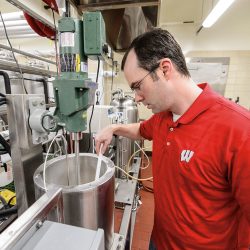 How awesome would it be if you could spend the second semester of your senior year brewing craft beer and getting credit for it? With the lab section of Food Science 375: Fermented Foods and Beverages, students (ages 21 and up, of course) can do just that. And the final exam isn’t just a blue book and a No. 2 pencil: it has 5.5 percent alcohol by volume (ABV) and is currently on tap at the Memorial Union Terrace.
How awesome would it be if you could spend the second semester of your senior year brewing craft beer and getting credit for it? With the lab section of Food Science 375: Fermented Foods and Beverages, students (ages 21 and up, of course) can do just that. And the final exam isn’t just a blue book and a No. 2 pencil: it has 5.5 percent alcohol by volume (ABV) and is currently on tap at the Memorial Union Terrace.
Professors Hans Zoerb ’70, PhD’83 and Jim Steele focus on three main themes: unifying scientific concepts, dairy products, and fermentation — which is where beer comes in. All students must have taken Biochemistry 501: Introduction to Biochemistry so that they have a firm grasp of metabolic flux. Though it sounds like something out of Back to the Future, metabolic flux refers to where and how carbon flows through a cell. “That’s truly fermentation sciences at its most basic,” Steele says.
This class has been taught for several semesters, but it caught the attention of Wisconsin Brewing Company’s brewmaster, Kirby Nelson, last semester. Steele held an extension short course during Madison Craft Beer Week and brought Nelson in as a guest speaker. While exploring the department’s mini-brewery in Babcock Hall — a donation from MillerCoors — Nelson met Charlie Coogan x’16, an FS375 student. Coogan and Matt Arbuckle x’16 were brewing a milk stout for class. Nelson tried the beer, loved it, and the collaboration took off.
This year’s class became a contest. Broken into three groups, the students took the basic fermentation concepts they’d learned and created their own 5.5 percent ABV red lager. In April, the brews went to a panel of judges, consisting of Nelson; the Great Dane Pub and Brewing Company’s brewmaster, Rob LoBreglio; David Rider of MillerCoors; and two supervisors from Memorial Union. The judges picked a winner and sent the recipe to the Wisconsin Brewing Company in Verona, Wisconsin, to be brewed en masse. On May 1, Inaugural Red debuted at the Terrace.
With the success of Inaugural Red, Steele and Zoerb are working on the next big thing: a fermented foods and beverages certificate, which will combine aspects of food chemistry, food engineering, fermentation sciences, microbial physiology, and business and marketing. “Research, teach, and extension,” Steele says. “It is truly the Wisconsin Idea.”
Published in the Summer 2015 issue



Comments
No comments posted yet.